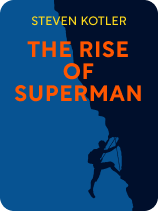

This article is an excerpt from the Shortform book guide to "The Rise of Superman" by Steven Kotler. Shortform has the world's best summaries and analyses of books you should be reading.
Like this article? Sign up for a free trial here.
Are you pushing yourself too hard? How can pursuing a flow state lead to burnout?
While Steven Kotler encourages setting ambitious goals, he also warns against pushing yourself too hard. Mastering a flow state allows people to achieve superhuman feats—climbers scaling harder routes or runners running faster races—but this can also lead to burnout and unmet expectations.
Read on to learn about the risks of pushing yourself too hard when pursuing flow, according to Kotler.
Are You Pushing Yourself Too Hard?
In The Rise of Superman, Steven Kotler explains how a flow state works and how you can unlock this state of mind. However, he also discusses the risks of pushing yourself too hard and the broader implications of pursuing flow.
According to Kotler, while flow is a powerful tool for growth and improvement, it has its downsides as well. By enhancing your ability to perform, flow encourages you to work at and push beyond your limits, which means pushing yourself too hard at times. Then, when you’ve achieved your most ambitious goal, you’re likely going to set even more ambitious ones.
(Shortform note: While setting ambitious goals may sound like a good thing, psychologists warn that pursuing extremely ambitious goals can also be risky. One study suggests that flow reduces your awareness of risk in the pursuit of goals. This can be especially dangerous for people who are new to an activity, as they might underestimate risks and lack the expert skills to overcome them.)
When this happens, Kotler warns that there’s a risk of pushing yourself too hard, leading to burnout or raising expectations so high that they become unwise or even dangerous to pursue. The world of extreme sports is full of such examples, with many athletes pushing themselves past their limits to the point of injury and even death. Additionally, the pleasurable feeling of being in flow can become addictive. Kotler states that people can be frustrated or depressed if they’re unable to get in a flow state for a long time.
(Shortform note: Kotler writes that pushing yourself too hard can result in burnout. In Flow, Csikszentmihalyi explains why pursuing flow can have this effect: A flow-inducing activity is an autotelic activity, which is something that you do just because you enjoy it. When you continually pursue these activities, you might overcommit to enjoyable yet ambitious goals and experience burnout. In Burnout, Amelia and Emily Nagoski list several ways you can recover from burnout: First, build self-compassion by distancing yourself from your negative inner thoughts. Next, build resilience to burnout by finding a larger purpose in your life. Lastly, recover from burnout by finding a support system and getting adequate rest.)
Being Mindful of Flow & the Risks
When you’re mindful of the risks of pushing yourself too hard, however, flow can be a powerful learning tool to improve your personal life as well as society as a whole. On an individual level, as you experience more flow in your life, you’ll naturally become more creative and innovative as a person, allowing you to handle harder challenges and progress more rapidly toward your goals.
(Shortform note: Mihaly Csikszentmihalyi elaborates that frequently entering a flow state allows you to gain self-confidence, enjoy life more fully, and achieve personal growth. Other experts add that practicing flow and becoming more creative can increase your happiness and well-being by improving your immune system functioning, cognitive functioning, and reducing feelings of stress, anxiety, and depression.)
On a societal level, institutions that embrace flow find more success. Employees and team members who are frequently in flow are more productive and generate more innovative solutions than their counterparts. Schools with environments that encourage flow, such as Montessori schools, can teach more effectively and cultivate higher-performing students.
(Shortform note: As Kotler mentions, the concept of flow has caught the attention of the corporate world, but what kind of environments are these businesses creating to encourage flow? Experts say that the optimal working environment has different spaces for different types of work, allows workers to focus intently without distractions, and gives employees more freedom to structure how they work. One Swedish company, Green Cargo, profited for the first time in 120 years after implementing a flow-based management approach that involved more frequent performance reviews and more quality time between managers and their employees.)

———End of Preview———
Like what you just read? Read the rest of the world's best book summary and analysis of Steven Kotler's "The Rise of Superman" at Shortform.
Here's what you'll find in our full The Rise of Superman summary:
- The importance of mastering flow for any activity
- The neuroscience behind the flow state
- Techniques for how you can encourage deep focus into your life






